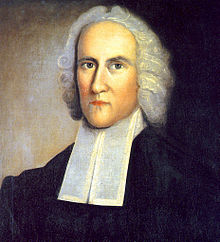Edwards’s ministered in a particular social context. Understanding his place in this context will help us to better understand Edwards ministry to young people. So first, it is important to give an outline of the social setting
in the years leading up to Edwards’s ministry.
Puritan parents were responsible for both the material and spiritual
upbringing of their children. [1] Materially this involved establishing them on
their own land with a spouse while spiritually this involved ensuring they grew
up into Christian adults. [2] Puritan ministers such as Cotton Mather
believed that not only was the spiritual rearing of children the most important
role for parents, it also revealed how seriously parents took their own faith. [3]
The Puritans also thought that it
was vital to educate children and teach them to read so that they could read
the Scriptures and grow up with a knowledge and hopefully a love of God.[4] Education existed primarily to prepare
children for conversion by teaching children good habits through which Puritans
believed God’s grace could flow. [5] Another Puritan minister, John Cotton encouraged
Parents to take their children to church so that they could continue to learn,
‘bring them to church and help them to remember something.’[6]
Another feature of Puritan life in
the period before Edwards was the power of parents over their children,
‘In several New England colonies,
children over the age of sixteen who cursed or struck their parents could be
put to death… no child was ever actually executed… but it [the law] was a chilling
reminder of paternal power in Puritan culture’.[7]
Finally, the outlook of Puritan
adults towards children and adolescents and faith should be noted. Catherine Brekus outlines the thinking of
some pastors in the time prior to Edwards,
‘Thomas Hooker, a famous
seventeenth-century divine [said], children were too irrational to understand
“the mysteries of life and salvation”. A
ten or twelve year old child, he claimed, lived “the life of a beast”’[8]
McLoughlin also notes that,
‘During adolescence, when the
child was faced with moving from a dependent to an autonomous role in the
community, he was expected to have a crisis conversion experience, during which
he replaced dependence on his father with dependence on God.’[9]
The Puritans believed that young
people were incapable of faith in God until a certain age, at which time they
essentially moved into adulthood.
Next week we'll see the changing context in which Edwards ministered...
[1] Edmund S. Morgan, The Puritan Family: Religion and Domestic Relations
in Seventeenth Century New England (New ed., rev. and enl.; New York:
Harper & Row, 1966), 87.
[3] Morgan, The Puritan Family, 87. If parents
cared only about the physical well-being of their children it showed they
themselves did not have a spiritual understanding.
[7] Catherine A. Brekus, ‘Children of Wrath, Children of Grace: Jonathan
Edwards and the Puritan Culture of Child Rearing’, in The Child in Christian
Thought (Religion, marriage, and family series; Grand Rapids, Mich: W.B.
Eerdmans, 2001), 307.
[8] Brekus, ‘Children of Wrath, Children of Grace: Jonathan Edwards and the
Puritan Culture of Child Rearing’, 313.
[9] William Gerald McLoughlin, Revivals, Awakenings, and Reform: An Essay
on Religion and Social Change in America, 1607-1977 (Chicago history of
American religion; Chicago: University of Chicago Press, 1978), 50.



0 comments:
Post a Comment